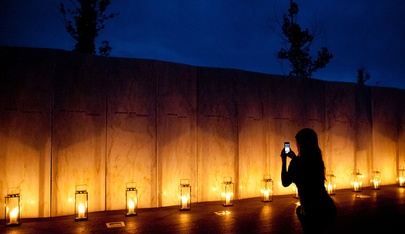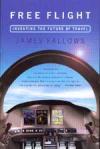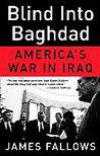
In a few hours, our partners at Marketplace will carry their latest “American Futures” report, this one on an unusual, high-speed, and high-stakes effort to revive the tattered downtown district of Allentown, Pa. Starting next Monday, here at the Atlantic’s site, Deb Fallows, John Tierney, and I will kick off a new season of American Futures reports with a series of posts on Allentown's ambitions, challenges, and personalities.
In between those two dates—to be precise, tomorrow night, Friday, at 8 p.m.—the new era in the town's long history will begin, when a brand-new 10,000-seat arena will have its debut event with a concert by The Eagles. If you're interested in getting tickets, good luck! Some people told us that the concert was entirely sold out three hours after tickets first went on sale; others, that it had taken 24 hours. Either way, it's a significant moment for the town.
What you see at the top of this post is the way the arena and its surroundings looked less than two weeks ago, when the most common downtown sites were cement trucks, construction cranes, paving crews, and other signs of people working hard against a deadline. What you see below this paragraph is one of many sketches of how a revived Allentown central district will look.

"Will this possibly be ready in time?" we asked ourselves—and our hosts. "Yes!" said mayor Ed Pawlowski, who has overseen the revitalization effort from the city-government's perspective. "Yes!" said J.B. Reilly, the developer most prominently involved in the downtown effort. "Yes!" said Lee Butz, whose construction firm is building the arena. We'll all know for sure tomorrow.
The story we plan to tell about Allentown and the surrounding Lehigh Valley region is different from what we expected before going there (which is, of course, the reason to make these trips), and I suspect different from the image that the city's name may call up in many people's minds. Billy Joel's anthem of industrial decline "Allentown" is misleading in a micro way. It's about the ripple effects of shutting down a huge steel works—but that was in fact the story of nearby Bethlehem and its enormous Bethlehem Steel plant, whose ruins have now become an eerily compelling modern-Stonehenge style arts center, concert venue, and casino. (The music-video is also an astonishing specimen of early-Reagan-era camp, but we'll save that for a later installment — plus the reasons why Billy Joel called the song "Allentown" rather than "Bethlehem" in the first place.)

Allentown has suffered its large industrial layoffs, notably with what had once been the world manufacturing center for Mack trucks. Now that is a center of advanced-tech and light-manufacturing startups—including a great brewery, and a "meadery"—working on what had been the Mack shop floors.

"walkable manufacturing" economy
We'll describe the goal of "walkable manufacturing" that the people running this center envision for their community.
But the overall economy of the Lehigh Valley region is stronger, for surprising reasons, than many outsiders would assume. What many people in Allentown describe as the city's real problem, and the challenge their new programs are designed to address, is specifically the decay of their historic downtown as a place where people were willing to shop, dine, spend time and money, work, live, and generally consider an attraction rather than a menace.
Thus when people in Allentown talk about a turning point downwards in their city's modern history, they're less likely to mention the Bethlehem Steel shutdown than the shuttering in the 1990s of the main Hess department store, which had been one of the highest-grossing retailers in the country. If you go to these archives of the Morning Call, you can find some astonishing Times-Square-on-New-Year's-Eve pictures of the throngs that once teemed in front of, and down the aisles inside, the main Hess store. (I will include some if I can get permission from the relevant people at the Morning Call. Meanwhile, here is one from Department Store Museum.) The Hess store and many other downtown retailers were the victims of, naturally, the spread of suburban sprawl-malls. By the way, the more we travel, the more we come to regard these malls as Public Enemy No. One in the mis-shaping of late 20th century America.

Getting an idea of what downtown Allentown had once been helped me understand a comment we heard from State Senator Pat Browne, a Republican who represents Allentown and who is credited with coming up with the tax plan, known as Neighborhood Improvement Zone or NIZ, that plays a crucial part in the investment boom now underway. "Ten thousand people coming right here, downtown!" he said two weeks ago, looking forward to what should happen tomorrow night. "What that will mean to everyone here ..."
If you look even a block or two in the wrong direction from the hub of all the construction, you can see all the signs of a still very troubled downtown area. Pawnshops, boarded up buildings, check-cashing operations. We'll report on how the city thinks it can spread prosperity from an intensely built-up center; what this will mean for the city's sizable Latino minority, many of whom are Puerto Ricans or Dominicans who have come from New York and New Jersey in search of a more affordable, safer life; why some of the area's companies have decided to shift their investments from suburban sprawl back downtown; how the area's school systems affect revival prospects; and more.

There's a lot riding on tomorrow's opening performance by The Eagles. I am happy to report that as of 2:30pm EDT Thursday, 30 hours before the opening, my friends in Allentown are saying that things seem all set and ready to go.

There's more to come, but that's enough for now. Over to Marketplace, and then to The Eagles, and see you here next week for more of the Allentown saga.































 In Focus
In Focus






